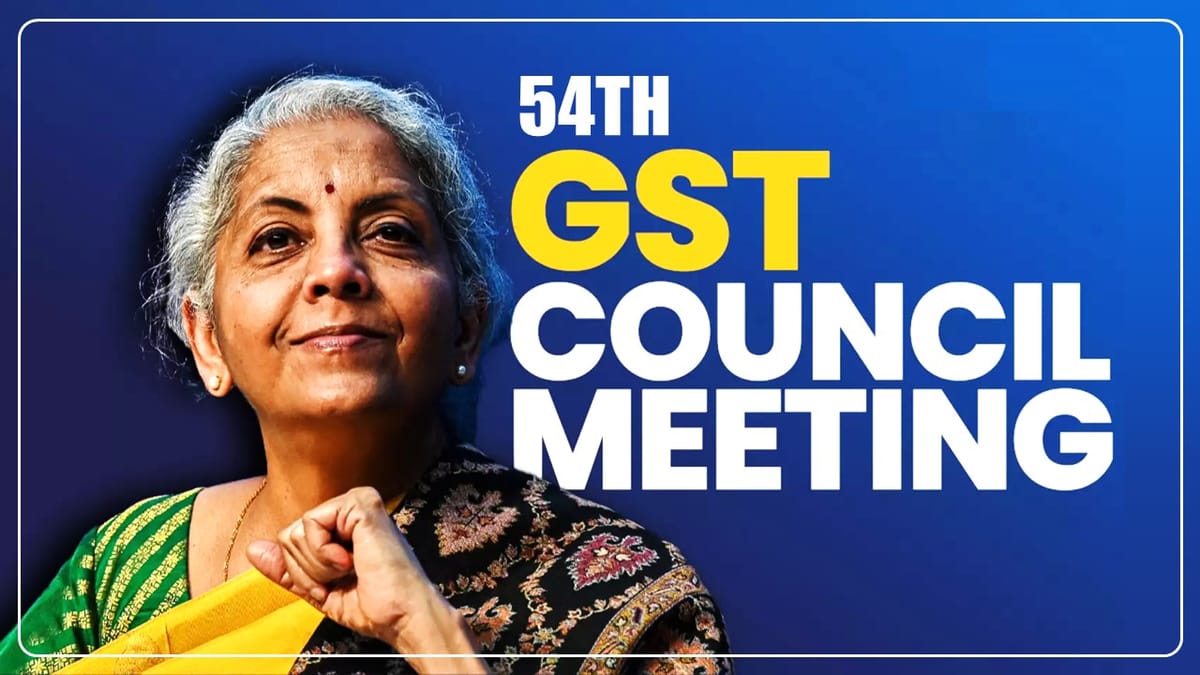Reetu | Sep 6, 2024 |

6 Big Expectations from the 54th GST Council Meeting
As the 54th GST Council Meeting approaches on September 9, 2024, in New Delhi, people are keen to see what changes may occur. Business leaders and industry groups are hopeful that the gathering will solve key concerns and clarify tax rules. With several critical items up for debate, this could be a watershed moment for the country’s financial system. Everyone is keeping a close eye out for potentially game-changing revisions.
Here are the 6 big changes we can expect from the 54th GST Council Meeting.
The recent creation of the GST Appellate Tribunals is a significant step toward expediting GST dispute resolution. However, the administration and effective implementation of these Tribunals must be expedited.
The GST Council must take decisive action to ensure that the Tribunals are active and efficient. The GST dispute resolution process has been placed on hold due to delays in the operationalisation of GST Tribunals, which have prevented dissatisfied taxpayers from filing appeals and seeking relief against orders issued by the Commissioner (Appeals).
Discussions on reducing the current four primary GST slabs (5%, 12%, 18%, and 28%) to three slabs have been ongoing for some time. A measure like this could streamline the tax structure and minimize compliance expenses, but it may also lead to inflation.
Businesses are closely monitoring any advances in this area since a streamlined rate structure might have a substantial impact on pricing and profitability. We anticipate that because rate setting is a complex exercise that requires assessment of macroeconomic and specific industry concerns, this topic will not be addressed in Council Meetings, but we may hear some statements regarding the status of this proposal.
The GST Council had previously established a Group of Ministers to investigate capacity-based taxation for commodities such as pan masala and gutka. There is a matter of tax evasion in these products, so it was recommended to impose a tax based on the maximum retail pricing of these commodities, shifting the burden of taxation to the manufacturing stage.
The Group of Ministers believed that efforts should be directed at maximising GST revenues at the initial stage of manufacturing, as leakages were discovered to be concentrated at the retailer level. There are also proposals for issuing notifications restricting refunds for these commodities’ exports.
Recently, the GST Network introduced a new method for pan masala and gutka makers to register their machines with tax officials. GSTN advised taxpayers on May 16 that an online capability for such manufacturers to submit machine-related information using form GST SRM-I has been added to the GST site.
Recent controversy has erupted over GST notices sent to foreign airlines and companies such as Infosys about GST on the import of services between foreign branch offices. There is optimism that the government will provide relief or explanation on the matter, preventing more disputes and easing the burden on impacted businesses.
The continuation of the Compensation Cess mechanism has been a challenging issue. With the current system having been extended multiple times, it is time to abandon the GST compensation mechanism, known as the Compensation Cess.
The Council may consider ideas that strike a compromise between states’ economic sovereignty and the necessity for a unified tax structure. Furthermore, a Compensation Cess is levied in addition to the GST on products falling inside the 28% slab. These products typically include aerated beverages, cigarettes, automobiles, and a variety of other items known as “sin goods”.
With the end of the Compensation Cess, which is a possible agenda item for the Council meeting, there may be a need to reconsider the rates on certain sin items.
The government’s tough stance on putting a 28% GST on online gaming activities has sparked concerns in the industry. Despite recent changes to the Act, it appears unlikely that the matter will be settled at the next Council meeting. It is anticipated that additional industry representation and legal discourse will be required to address the concerns of stakeholders in this sector.
The GST Council clarified in its meeting in August 2023 that online gambling platforms needed to pay 28% tax, and the Central GST law was thereafter changed to make the taxing requirement clear.
Offshore gaming platforms were also required to register with GST authorities and pay taxes; otherwise, the government would shut their sites.
The Council then decided to evaluate the taxation of the online gaming sector after six months of implementation.
The Council adopted a number of taxpayer-friendly provisions at its June meeting, including a waiver of interest and penalties for demand notices given during the first three years of GST – 2017-18, 2018-19, and 2019-20 — if the full amount required is paid by March 31, 2025.
In case of any Doubt regarding Membership you can mail us at [email protected]
Join Studycafe's WhatsApp Group or Telegram Channel for Latest Updates on Government Job, Sarkari Naukri, Private Jobs, Income Tax, GST, Companies Act, Judgements and CA, CS, ICWA, and MUCH MORE!"